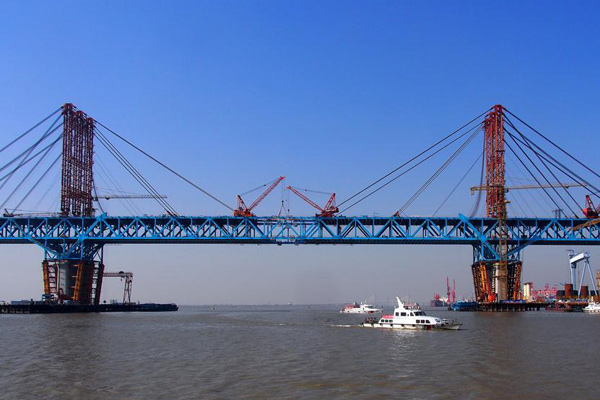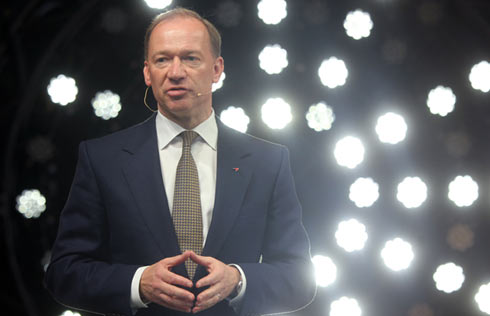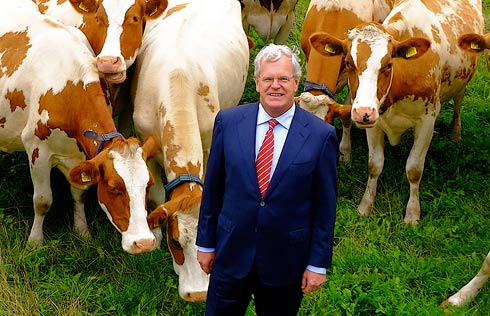Dyson's eyes on Chinese markets
The career path of Dyson gradually adjusted until he found his real interest, too. He earned a place to study art at the Byam Shaw Art School in London, now part of Central Saint Martins College of Art and Design, where he found himself increasingly drawn away from art toward design. Next stop was the Royal College of Art where he took the leap from furniture design to industrial design - working with plastic and stainless steel to design solutions to everyday frustrations. And so began a lifelong passion for functional design.
His work is usually inspired from observing of existing instruments, including "reinventing the wheel", as he did with the Ballbarrow and the vacuum cleaner.
The wheelbarrow's metal predecessor hadn't changed for 2,000 years but James Dyson designed a smooth-edged plastic bin to replace it, which does not rust or allow fresh cement to stick to it. He also gave it more stability, replacing the wheel with a load-spreading red ball that stopped it sinking into soft ground.
His world-famous cyclone technology-based vacuum cleaner was inspired by a local sawmill. He noticed how the sawdust was removed from the air by large industrial cyclones. After 5,127 prototypes, he perfected and applied the technology working on the smaller scale Dyson DC01 vacuum cleaner. It finally began rolling off the production line in 1993. Within 18 months it was the biggest selling vacuum cleaner in the UK.
"Failure is the mother of invention," says Dyson. By the mid-1980s he was heavily in debt but he doggedly continued on his one-man licensing tour to promote his invention.
When he became well established as an inventor and engineer after the early, hard days, Dyson founded The James Dyson Foundation, a registered charity, in 2002. It was created to inspire the next generation of problem-solvers and support medical research charities, design technology and engineering educational work and community projects in and around Wiltshire.
"We are perfectionists and we invest 15 million yuan a week to make our technology the best it can be. Not only do we improve, we invent. We take old problems and develop new solutions - real solutions - to everyday problems, not gimmicks and imitations that simply look like they're doing the job," says Dyson.
Investing in innovation
To achieve continuous innovation, Dyson Ltd has spent more than 100 million pounds investing in a new compact digital motor. Spinning at 100,000 revolutions per minute, it is four times faster than a Formula One engine. "It's the brains behind our handheld vacuum cleaners and Airblade hand driers, giving high performance from a compact and efficient motor," says Dyson.
Dyson will put a significant proportion - 20 percent - of profits back into research and development in the next five years. The company has a pipeline of technology which stretches back 25 years. Many of the ideas are in their formative stages but research into new materials and their possible application is "exciting", says the founder. "It will allow us to create high performing technology and continually challenge ourselves to do more with less," says Dyson.
Since 1979, Dyson Ltd had gathered more than 1,900 patents worldwide from more than 3,500 applications and 1,000-plus registered designs worldwide from more than 1,200 registered design applications by 2012.
As a user of made-in-China and designed-in-China products, Dyson says China seems to be a pivot point.
"There is a growing awareness of and impatience with copycats. People are demanding better quality, well designed products from domestic and international companies," he says.
Before Dyson Ltd officially launched its products in China in 2011, many cheap copycats with labels including "Replica of Dyson" or "Dyson-style" were widely seen, especially on e-commerce platforms.
Dyson says a rigid intellectual property system is essential to protecting technology sold in China, both granting and enforcing patents.
"Great progress has been made by the courts in processing litigation but inventions and ideas need to be protected on the streets as well as in the courts. The investment in innovations is offset by the ability to protect our inventions and we do so determinedly," he says.
In 2012, the company spent 35 million yuan battling copycats, only to make a tiny fraction back in damages, according to its own figures. "This is money that could be re-invented into new jobs and developing new technology. As an inventor, I look at one of my machines and see all the time, money and effort that has gone into it. Infringers see a cheap win. We will continue to proactively protect our technology and be an advocate for ideas," says Dyson.
wuyiyao@chinadaily.com.cn























